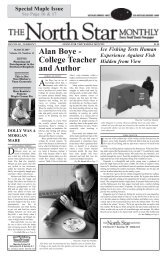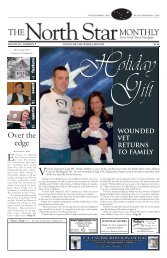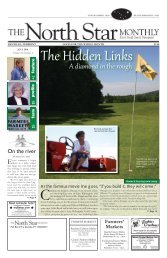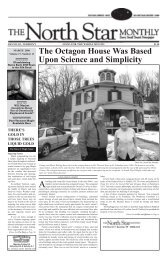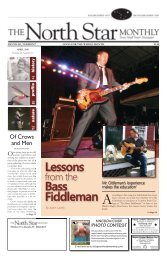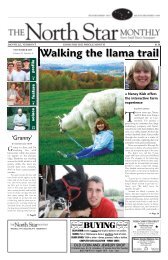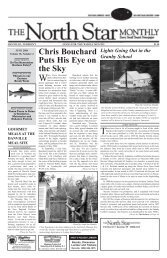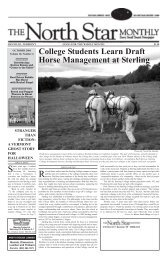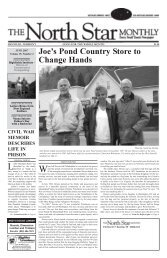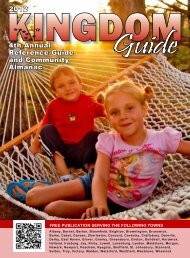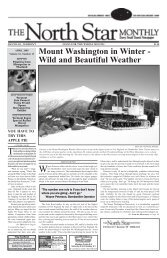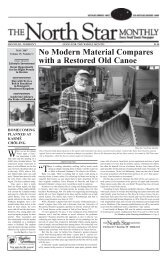May - The North Star Monthly
May - The North Star Monthly
May - The North Star Monthly
Create successful ePaper yourself
Turn your PDF publications into a flip-book with our unique Google optimized e-Paper software.
www.northstarmonthly.com MAY 2010 15<br />
Letters from the Past<br />
When writing was a necessity and an art<br />
By Lynn A. Bonfield<br />
Peacham native, Martha Johnson, taught at a freedmen’s school at Port Royal on<br />
the Sea Islands of South Carolina from 1863 until her death in 1871. When<br />
President Lincoln issued the Emancipation Proclamation and Union forces took<br />
over abandoned Confederate property, private freedmen organizations were formed to<br />
educate the former slaves.<br />
Peacham native, Martha Johnson,<br />
taught at a freedmen’s school at<br />
Port Royal on the Sea Islands of<br />
South Carolina from 1863 until her<br />
death in 1871. When President Lincoln<br />
issued the Emancipation<br />
Proclamation and Union forces<br />
took over abandoned Confederate<br />
property, private freedmen organizations<br />
were formed to educate the<br />
former slaves. <strong>The</strong> first teachers at<br />
Port Royal arrived in March 1862.<br />
Martha came a year later when approximately<br />
thirty schools had been<br />
established on the islands with<br />
about two thousand students.<br />
<strong>The</strong>se students attended school<br />
only part time as their labor was<br />
needed in the fields where they were<br />
paid wages, no longer slave labor.<br />
<strong>The</strong> curriculum began with the alphabet<br />
before going on to classes in<br />
reading, writing, and arithmetic. Of<br />
the 40,000 former slaves on Sea Islands,<br />
there were schools for only a<br />
fortunate few.<br />
<strong>The</strong> freedmen school teachers<br />
were mainly <strong>North</strong>ern Anglo-Saxon<br />
Protestant females; all younger than<br />
twenty-eight and mainly educated in<br />
the common schools. Martha had<br />
attended Peacham’s outstanding<br />
academy but then also went to New<br />
Hampshire in 1839 to attend the<br />
Franklin Academy. Every page of<br />
an autograph book (now in a private<br />
collection) the well-liked young<br />
woman kept is full of friendship<br />
poems and best wishes signed from<br />
1839 to 1848 by students and teachers<br />
from each academy.<br />
By 1855, Martha was working<br />
on Blackwell’s Island as a matron to<br />
the female inmates of the New<br />
York State Penitentiary. She returned<br />
to Peacham when her<br />
mother became ill and remained<br />
until 1863 when she received a<br />
commission from the National<br />
Freedman’s Relief Association of<br />
New York to teach newly freed<br />
slaves in the Union occupied areas.<br />
Applicants were reviewed for<br />
health, energy, morality, religious<br />
conviction, and experience.<br />
Martha’s poor health was apparently<br />
overlooked in respect for teaching<br />
experience and deep personal faith,<br />
well exhibited in the following letter<br />
Credit: Vermont Historical Society, MS. 185.<br />
Martha Johnson’s Certificate of Commission issued by the National<br />
Freedman’s Relief Associations.<br />
to her sister, Caroline, nicknamed<br />
Cassie, in Peacham.<br />
Martha was the oldest of nine<br />
children of Betsey Merrill Johnson<br />
(1800-55) and Leonard Johnson<br />
(1797-1890). Her father, an abolitionist,<br />
rang the church bell for an<br />
hour when John Brown was hanged<br />
in 1859. He was excommunicated<br />
from the Congregational church for<br />
using “unchurchly language against<br />
one of his fellow parishioners” in<br />
an argument over “the slavery question.”<br />
In 1867, when brought back<br />
into church membership, he wrote<br />
in his apology letter: “At least, time<br />
has shown that I was right on the<br />
Don’t let your growing business outgrow your insurance.<br />
You started small – just you and a computer. Got a partner. Broke<br />
ground on a new building. Added new equipment. More employees,<br />
another partner. Suddenly it’s ten years down the road and<br />
that small business you started with isn’t quite so small. At<br />
Sawyer & Ritchie, we can make sure that your insurance needs<br />
reflect the company you have today, with full coverage solutions<br />
for property, liability, workers’ comp, commercial auto and more.<br />
No matter how fast your business grows, we’ll make sure your<br />
insurance keeps up.<br />
John Blackmore<br />
George Coppenrath<br />
Sam Kempton<br />
anti-slavery question.” Martha’s<br />
uncle, Oliver Johnson (1809-89),<br />
was a close associate of William<br />
Lloyd Garrison and served as an editor<br />
for several abolitionist newspapers.<br />
Cassie Johnson, also taught in a<br />
freedmen school spending two<br />
years in Hampton, Virginia. <strong>The</strong><br />
Johnson sisters traveled to the<br />
South from Vermont where the<br />
state’s first constitution in 1777 outlawed<br />
slavery; from Peacham, a<br />
town with an active Anti-Slavery Society<br />
organized in 1833 (the third in<br />
Vermont); and from the Johnson<br />
family with strong abolitionist leanings.<br />
After years of poor health during<br />
which time Martha continued to<br />
teach, she died and was buried in the<br />
cemetery of the Episcopal Church<br />
in Beaufort under a stone with the<br />
inscription: “To the Memory of<br />
Martha Johnson, Born at Caledonia<br />
County Peacham, Vermont September<br />
22ne 1822, Died in Beaufort,<br />
South Carolina, December<br />
24th 1871.”<br />
198 Route 2<br />
W. Danville, VT<br />
P.O. Box 196<br />
802-684-3411<br />
nwjinsurance.com<br />
A DIVISION OF NOYLE W. JOHNSON, INC.<br />
Perryclear Plantation<br />
[South Carolina]<br />
<strong>May</strong> 23rd 1863<br />
Dear Cassie:<br />
Jack Doctor went to Beaufort<br />
yesterday and brought me your letter<br />
. . . and a big bundle that Aunt<br />
Mary Ann sent me. I wrote to her<br />
for a musquito net, calico dress, and<br />
a hat. She sent them and another<br />
dress as a present, two pairs of Pillow<br />
cases, four knives and forks, two<br />
tea spoons, two large spoons, Bowl<br />
Pitcher and pail. . . . You may smile<br />
at my wearing a hat, but everybody<br />
wears them here. It is the best of<br />
anything for this climate as it shades<br />
the face and is cool for the head. . .<br />
. I have not been to church since I<br />
came here for we know no men to<br />
row the boat and is a very hard days<br />
work to go to Beaufort and back<br />
again. We have Sabbath school for<br />
the children and sometimes the men<br />
and women come in and we have a<br />
“prisne” meeting as they call it.<br />
With very few exceptions those that<br />
are Gospel men and women as they<br />
express it, meaning members of a<br />
church, are Baptist and they are not<br />
allowed by the ministers and elders<br />
to go to any other church. . . . I enjoy<br />
our Sabbath school very much for<br />
the children seem to love to come<br />
very much and I feel that with the<br />
blessing of my Heavenly Father I<br />
am sowing the good seed that may<br />
eventually bring forth fruit. . . . [I]<br />
have a school of my own two miles<br />
from here. Go every morning at<br />
half past seven o’clock and return at<br />
half past ten, and three days in the<br />
week I go again in the afternoon at<br />
five o’clock for the benefit of the<br />
men and women who cannot come<br />
in the morning. . . . I have a nice<br />
school of thirty children and twenty<br />
five men, soldiers of the first Colored<br />
S[outh] C[arolina] Regt. <strong>The</strong>y<br />
do Picket duty on this Island. <strong>The</strong><br />
headquarters are very near my<br />
school and the Capt. of the company<br />
asked permission for the boys<br />
to come to school. I very gladly<br />
gave them permission to come. It is<br />
uncertain how long I may have<br />
them, but I shall endeavor to do<br />
them all the good I can. <strong>The</strong>y are,<br />
some of them, very fine looking<br />
men. Very few can read anything<br />
more than the letters, but are improving<br />
fast. I have two or three<br />
only that can read in the testament.<br />
I wish you could look in upon me<br />
surrounded by the dark faces, but<br />
bright and pleasant. My school<br />
room [is located] in the Piazza of<br />
the old Plantation house. When I<br />
have all the children and a good<br />
many soldiers, I have to send a part<br />
of them out of doors. . . .<br />
I realize more and more every<br />
day the awful wickedness of Slavery<br />
Bruce and the Crew<br />
Don’t forget to remember... over 30,000 square feet<br />
of greenhouses and cold frames filled with...<br />
Annual Flowers Geraniums Perennials Herbs<br />
Vegetable Plants Hanging Baskets Memorial Pans<br />
Stop by for a glimpse<br />
of Spring!<br />
Saturday & Sunday<br />
<strong>May</strong> 1st & 2nd<br />
OPEN HOUSE<br />
Door Prizes & Refreshments<br />
10 a.m.-4 p.m.<br />
ALL PERENNIALS<br />
10% off<br />
All day long.<br />
BOTH DAYS!<br />
OPEN 7 DAYS A WEEK<br />
Monday-Saturday 9 a.m. to 7 p.m.<br />
Sunday 9 a.m. to 6 p.m.<br />
On the Red Village Road, Lyndonville, VT (802) 626-9545<br />
Gift Certificates<br />
and wonder they are as good as they<br />
are. I have visited them in their<br />
homes as much as I could find time<br />
or strength. <strong>The</strong>y seemed a little<br />
suspicious at first but now they give<br />
me a pleasant greeting and seem<br />
pleased to see me and have me talk<br />
with them. <strong>The</strong>y all seem to have a<br />
strong religious element in their nature.<br />
Cut off from all earthly comfort,<br />
they have gone to God for<br />
consolation. <strong>The</strong>ir childlike faith<br />
and entire confidence in their Heavenly<br />
Father is often a reproof to me<br />
for I have so much more given to<br />
me than these poor degraded children<br />
of our common Father. I have<br />
not yet heard one man or woman<br />
speak unfriendly of their old Massa<br />
or Missus, say they worked them<br />
hard and did not give them enough<br />
to eat and don’t care to see them but<br />
never seem [to] cherish a revengeful<br />
feeling towards them. . . .<br />
<strong>The</strong> great fear that has prevailed<br />
in the north of the colored people<br />
all working north if they were free–<br />
nothing but Slavery will drive them<br />
from their homes. <strong>The</strong>y are so<br />
strongly attached to their old homes,<br />
they do not like to go to another<br />
Plantation to live and almost without<br />
exception reply when asked if<br />
they would like to go north “I had<br />
rather stay in my old home. I am<br />
used to this place and don’t know<br />
anything about the <strong>North</strong>.”<br />
[A few sentences urging her sister<br />
to join her as a teacher and reports<br />
that “a graduate of South<br />
Hadley” has come and will teach.] I<br />
do not think it wise for you to come<br />
at this season for it takes time to get<br />
an appointment and you could not<br />
get here before it would be very hot<br />
weather. Today it is as hot as any<br />
weather in Vermont. Sun is so hot<br />
that one can hardly stand it a moment.<br />
Not a breath of air stirring<br />
and summer has not yet come. . .<br />
Write soon to your sister,<br />
Martha<br />
This letter and others written by<br />
Martha Johnson are preserved at the Vermont<br />
Historical Society with parts having<br />
been published in Vermont History 67<br />
(Summer/Fall, 1999) 101-14. Letters in<br />
this series are transcribed as written with<br />
no changes to spelling, punctuation, or capitalization.<br />
Editor’s additions are in brackets;<br />
words missing are indicated by ellipses.<br />
Don’t forget<br />
to remember...<br />
your Mother<br />
on Mother’s Day,<br />
<strong>May</strong> 9 with a gift<br />
from Houghton’s<br />
Greenhouses.<br />
A free potted viola<br />
to every mother<br />
at the greenhouse on Saturday<br />
& Sunday,<br />
<strong>May</strong> 8 & 9



